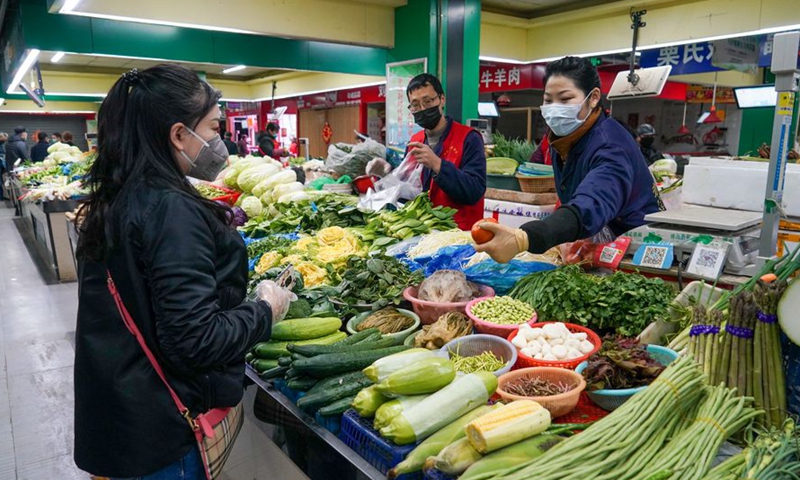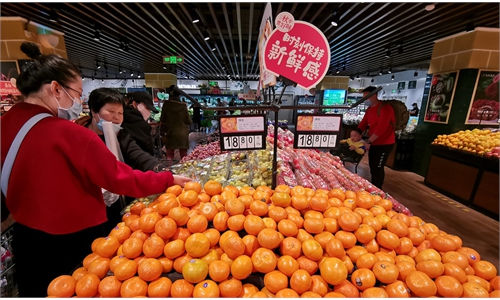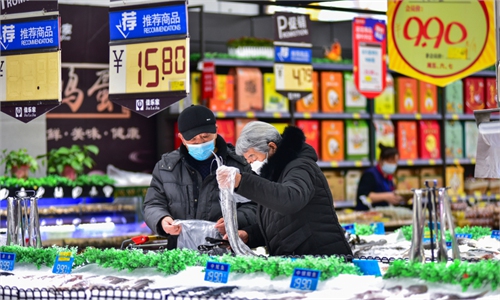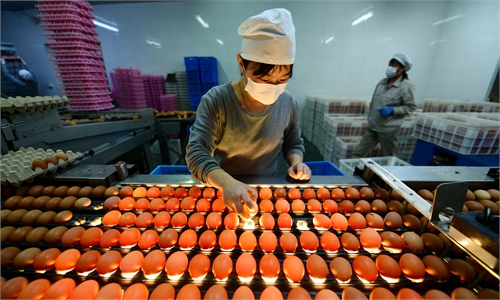
Citizens buy vegetables at a market in Nanjing, east China's Jiangsu Province.Photo:Xinhua
China's two leading economic authorities, the People's Bank of China (PBC), the central bank, and the National Bureau of Statistics (NBS), made a series of comments on Monday and Tuesday, further dispelling concerns that the country may face deflation risks.
The Chinese economy does not face the risk of deflation, nor will it be an issue in the future, Fu Linghui, a spokesperson for the NBS, said on Tuesday, noting that low consumer prices are just a transitory phenomenon and the overall price level is poised to rise in the coming months, on the back of expected growth in services consumption.
China's consumer price index (CPI) grew 0.1 percent in April on a yearly basis, with growth pace down 0.6 percentage points from March, mostly caused by short-term factors, including declines in food and energy prices, in addition to price-off promotions for a range of durable consumer goods such as vehicles, Fu said at a press briefing on Tuesday, where the NBS released key metrics of China's economy in April.
Lower consumer prices are also the result of a high base effect, according to Fu. China's CPI jumped 2.1 percent in April 2022, due to the combined effect of elevated food prices and soaring global energy prices, against the backdrop of the pandemic and rising geopolitical tensions.
Energy prices plunged 5.4 percent year-on-year in April, expanding a decline from March. Food prices rose 0.4 percent year-on-year in April, dipping 1.0 percent from the previous month, as shown in a breakdown released by the NBS last week.
"The core CPI, excluding food and energy prices, offers a more comprehensive gauge of consumer prices. China's core CPI rose 0.7 percent year-on-year in April, the same as in the previous month, reflecting overall stability," said Fu.
He said that the steady expansion of services consumption will accelerate price rebounds across the travel, transportation, accommodation and catering sectors, and propel the core CPI to return to a "reasonable level."
In April, services prices increased 1 percent year-on-year, expanding 0.2 percentage points from March and rising for a second consecutive month.
Also, the effect of measures to shore up consumption, the improvement of employment, rising incomes and consumer confidence will lead to an overall rise in the CPI, pushing it to "rise to a reasonable range", according to Fu.
The PBC said on Monday in its quarterly report that there is no basis for China to experience long-term deflation or inflation as commodity prices keep increasing moderately. It's expected that the CPI may experience a moderate increase in the second half of 2023 and may rebound to near the average level in recent years by the end of the year.
China's CPI showed declines several times in the past two decades. For instance, in 2002, the CPI contracted for 10 consecutive months. However, the declines didn't significantly affect the country's macroeconomy, which maintained high-speed growth.
The PBC said that if the economy maintains normal growth, the impact of the periodic drop in CPI should not be exaggerated.
In the first quarter of 2023, GDP growth reached 4.5 percent year-on-year, exceeding expectations and leading the world's major economies. The steady improvement and apparent resilience of the Chinese economy have led international institutions to upgrade their forecasts for China's economic growth in 2023.
Global Times



